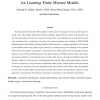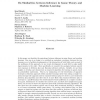179 search results - page 34 / 36 » On Learning Algorithms for Nash Equilibria |
154
Voted
GECCO
2010
Springer
15 years 1 months ago
2010
Springer
This paper takes an economic approach to derive an evolutionary learning model based entirely on the endogenous employment of genetic operators in the service of self-interested a...
125
click to vote
PAMI
2008
15 years 1 months ago
2008
The Expectation Maximization (EM) algorithm is widely used for learning finite mixture models despite its greedy nature. Most popular model-based clustering techniques might yield...
139
click to vote
GLOBECOM
2008
IEEE
15 years 8 months ago
2008
IEEE
—Cooperative spectrum sensing has been shown to greatly improve the sensing performance in cognitive radio networks. However, if the cognitive users belong to different service p...
127
click to vote
JAIR
2008
15 years 1 months ago
2008
In this paper, we elucidate the equivalence between inference in game theory and machine learning. Our aim in so doing is to establish an equivalent vocabulary between the two dom...
120
click to vote
ATAL
2007
Springer
15 years 8 months ago
2007
Springer
Regret based algorithms have been proposed to control a wide variety of multi-agent systems. The appeal of regretbased algorithms is that (1) these algorithms are easily implement...


